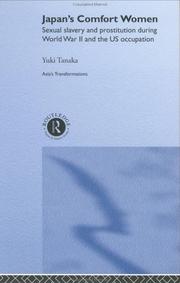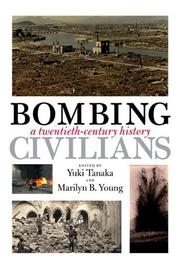| Listing 1 - 3 of 3 |
Sort by
|

ISBN: 0415194008 0415194016 9780415194013 128035481X 0203302753 9780203302750 9780415194006 9781134650088 9781134650125 9781134650132 1134650124 Year: 2003 Publisher: London New York Routledge
Abstract | Keywords | Export | Availability | Bookmark
 Loading...
Loading...Choose an application
- Reference Manager
- EndNote
- RefWorks (Direct export to RefWorks)
Japan's Comfort Women tells the harrowing story of the ""comfort women"" who were forced to enter prostitution to serve the Japanese Imperial army, often living in appalling conditions of sexual slavery. Using a wide range of primary sources, the author for the first time links military controlled prostitution with enforced prostitution. He uncovers new and controversial information about the role of the US' occupation forces in military controlled prostitution, as well as the subsequent ""cover-up"" of the existence of such a policy. This groundbreaking book asks why US occupation.
Comfort women --- World War, 1939-1945 --- Soldiers --- Femmes de réconfort --- 2ème guerre mondiale --- Soldats --- Women --- Sexual behavior. --- Femmes --- Sexualité --- Japan --- Japon --- History --- Histoire --- J3385.90 --- Japan: History -- Gendai, modern -- Shōwa period -- World War II (1931-1945) -- comfort women, ianfu --- Sexual behavior --- Femmes de réconfort --- 2ème guerre mondiale --- Sexualité --- Armed Forces personnel --- Members of the Armed Forces --- Military personnel --- Military service members --- Service members --- Servicemen, Military --- Armed Forces

ISBN: 9781595583635 1595583637 9781595585479 1595585478 Year: 2009 Publisher: New York: New Press,
Abstract | Keywords | Export | Availability | Bookmark
 Loading...
Loading...Choose an application
- Reference Manager
- EndNote
- RefWorks (Direct export to RefWorks)
From the Publisher: A groundbreaking historical analysis of indiscriminate bombing from the advent of aircraft to the present war in Iraq.
Military history, Modern --- Civilian war casualties --- Bombing, Aerial --- World War, 1939-1945 --- J3388 --- J3388.80 --- Aerial bombing --- Air strikes --- Airstrikes --- Air warfare --- Bombardment --- Bombers --- Casualties, Civilian war --- Civilian casualties of war --- War casualties --- History --- Casualties --- Aerial operations, American --- Japan: History -- Gendai, modern -- Shōwa period -- World War II -- Pacific war (1941-1945) --- Japan: History -- Gendai, modern -- Shōwa period -- World War II -- atomic bombs on Hiroshima and Nagasaki (1945) --- Casualties (Statistics, etc.) --- World War (1939-1945) --- Military history, Modern - 20th century --- Civilian war casualties - History - 20th century --- Bombing, Aerial - History - 20th century --- World War, 1939-1945 - Casualties --- World War, 1939-1945 - Aerial operations, American
Book
ISBN: 9004215913 9789004215917 9004203036 9789004203037 Year: 2011 Publisher: Leiden Boston Martinus Nijhoff Publishers
Abstract | Keywords | Export | Availability | Bookmark
 Loading...
Loading...Choose an application
- Reference Manager
- EndNote
- RefWorks (Direct export to RefWorks)
The aim of this new collection of essays is to engage in analysis beyond the familiar victor’s justice critiques. The editors have drawn on authors from across the world — including Australia, Japan, China, France, Korea, New Zealand and the United Kingdom — with expertise in the fields of international humanitarian law, international criminal law, Japanese studies, modern Japanese history, and the use of nuclear, chemical and biological weapons. The diverse backgrounds of the individual authors allow the editors to present essays which provide detailed and original analyses of the Tokyo Trial from legal, philosophical and historical perspectives. Several of the essays in the collection are based on the authors’ extensive archival research in Japan, Australia, the United States and New Zealand, providing rich insights into Japanese societal attitudes towards the Trial, biological experimentation by the Japanese Army in China, as well as the trial of Korean prison guards and prosecutions for rape and sexual assault in the post-war period. Some of the essays deal with particular participants in the Trial, examining the role of individual judges, and the selection of defendants and the decision not to prosecute the Emperor. Other essays analyse the Trial from a legal perspective, and address its impact on concepts such as command responsibility, conspiracy and war crimes. The majority of the essays seek to identify and address some of the ‘forgotten crimes’ in the Tokyo Trial. These include crimes committed in China and Korea (particularly the activities of the infamous Unit 731), crimes committed against comfort women, and crimes associated with the atomic bombings of Hiroshima and Nagasaki, the conventional firebombing of other Japanese cities and the illicit drug trade in China. Finally, the collection includes a number of essays which consider the importance of studying the Tokyo Trial and its contemporary relevance. These issues include an examination of the way in which academics have ‘written’ the Trial over the last 60 years, and an analysis of some of the lessons that can be drawn for international trials in the future.
| Listing 1 - 3 of 3 |
Sort by
|

 Search
Search Feedback
Feedback About UniCat
About UniCat  Help
Help News
News